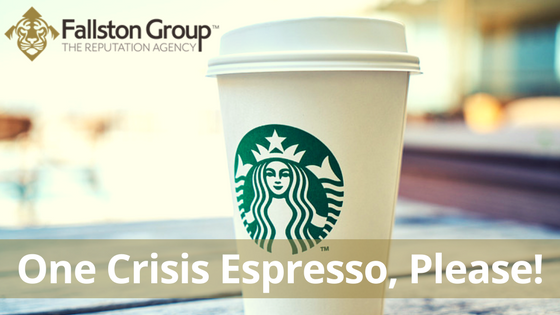by Rob Weinhold, Chief Executive of Fallston Group
Social media attack, bad press, investigation, litigation, data breach, sex scandal, economic downturn, discrimination, mismanagement and, tragically occurring with greater frequency, active shooter situations…the list goes on and on. Life comes at you fast, and there’s one irrefutable certainty: the issue isn’t “if,” but “when” crisis will come knocking on your door.
Crisis came pounding on Starbucks’ door recently, with sonic, viral velocity. When two black men were arrested in a Philadelphia Starbucks, chief executive officer Kevin Johnson didn’t pass the buck or glide over the incident as an unfortunate misstep. He promptly said, “I own it. This is a management issue, and I am accountable.” He went on to call the arrests “reprehensible.”
But what does being accountable mean? After observing hundreds of organizations in crisis over the years, many opt to provide lip service and simply make it through the next day’s news cycle until some other company assumes the daily crisis crown. In fact, many leaders say and do nothing…a spiraling disaster. Note Fallston Group’s mantra: “If you don’t tell your story, someone else will. And, when someone else tells your story, it certainly won’t be the story you want told!” Johnson is choosing to tell the organization’s story, and often.
Starbucks has given a strong response since the start of their crisis. Leadership is visible, on message, on many media platforms and passionate – their primary and secondary spokespeople are believable and appear staunchly committed to long-term change. Both Johnson and founder and chief executive, Howard Schultz, are withdrawing huge sums from their reputational piggy bank. By the way, Starbucks is a $22 billion company and so far, stocks have remained steady. This is a function of true leadership and aligned marketplace confidence. I firmly believe reputation equals trust, trust equals valuation.
Starbucks’ leadership announced the closure of all 8,000 company-owned stores in the U.S. on May 29 to train 175,000 employees about racial bias. The best decision was engaging training guidance from former Attorney General Eric Holder and a key member of the NAACP. Even though Starbucks already has a very capable, diverse board, leveraging its outside network is a critical, effective strategy – inclusion enhances credibility. However, training is just the first step. The initial training should be followed by routine assessment, policy development, rigorous ongoing training and modeled behavior. All these elements must be coupled with inclusionary leadership development and decision-making. It’s about long-term organizational change.
Crises cost time, money, customers and ultimately, your career. After decades helping people during life’s most critical times, I’ve come to realize that crisis is not to be feared. In fact, crisis can be a growth strategy. And growth doesn’t always show up in a stock price…in this case, this incident will be the springboard for a more equitable corporate setting and inclusionary customer experience. Once stabilized, crisis should not be relegated to the rear-view mirror with an exhale of relief. It is an opportunity to continue to climb the chairlift; this is where real substantive change is created.
Remember: reputation equals trust, and trust equals valuation. When you understand this key component of leadership, crisis is no longer just something to “get through.” It is a unique opportunity for you to guide your company to a more brilliant and prosperous future. Everyone will be watching, Starbucks…so far, you are doing the right thing. But, don’t fall off the chairlift!
To learn more about crisis & issue leadership offerings at Fallston Group, click here or contact us at 410-420-2001.

